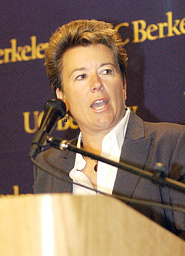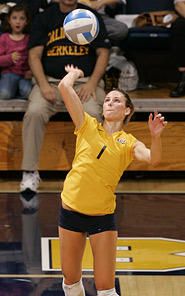Berkeleyan
Self-study affirms Cal's commitment to NCAA's principles
Peer-reviewed reports focus on governance/compliance, academic integrity, and student-athlete welfare, equity
![]()
| 02 May 2007
The National Collegiate Athletics Association (NCAA) has certified a comprehensive self-study of Intercollegiate Athletics at Berkeley, confirming that the athletic department is operating in full compliance with NCAA operating principles.
This recognition by the NCAA DivisionaI Committee on Athletics Certification, presented without conditions, demonstrates Berkeley's commitment to sustaining a broad-based, nationally competitive athletics program that supports student-athlete academic needs and interests.
 Sandy Barbour (John Dunbar photo) |
"I would like to thank all of the faculty, staff, alumni, and Bear Backers who worked so diligently on this important project," said Director of Athletics Sandy Barbour. "This collaborative effort provided a thorough examination of our department. It confirms that we are achieving the proper balance of academics and athletics and that we do so with a high degree of integrity. Still, as the final report notes, we have challenges ahead of us, and we are prepared to meet them head on."
The NCAA certification-evaluation process, which took more than 18 months to complete, included input from more than 50 members of the campus community, including the chancellor, two vice chancellors, a vice provost, and two Academic Senate chairs. Faculty members selected by the Senate, as well as leaders of the general student population, student-athletes, coaches, athletic department administrators, and members of both the California Alumni Association and the Bear Backer athletics donor group, also participated.
"The findings of the NCAA certification go beyond the remarkable successes of Cal's athletics program to reflect the notable academic performance of our student-athletes," said law professor Jesse Choper, who also serves as Berkeley's faculty athletics representative. "The success we are seeing is a direct result of the leadership and support of Berkeley's administration, from chancellors on down, over the past several decades."
Berkeley's current chancellor, Robert Birgeneau, said that the NCAA's certification "confirms my belief that when it comes to athletics we can excel both athletically and academically." Cal currently stands in third place in the 2006-07 Directors' Cup rankings, which measure the best overall collegiate athletics programs in the country based on national finishes. Last year Cal placed a program-record seventh among more than 325 Division I programs. The campus sponsors a total of 27 intercollegiate sports - 14 for women and 13 for men - and features one of the NCAA's larger sports programs with more than 850 student-athletes.
A commitment to integrity
Created by the NCAA in 1993, athletics certification, which is conducted by each institution once every 10 years, is meant to ensure the NCAA's fundamental commitment to integrity in intercollegiate athletics. The program is structured to achieve its goal by opening the affairs of athletics to the university community and the public, with key campus personnel reviewing, analyzing, and assessing the athletics program.
Once completed, the study reports are evaluated by a team of peer reviewers from other institutions and conferences. In Cal's case, the peer visit was chaired by Victor Boschini, president of Texas Christian University. The peer group reviewed all materials and provided input to the NCAA certification committee prior to final approval of the self-study.
The report's findings and recommendations were divided into three sub-groups: governance and compliance, academic integrity, and student-athlete welfare and equity. In each area the report commended the campus on its practices but recommended changes for improvement.
Among the steering committee's most significant conclusions was its recognition that the campus has addressed gender-equity issues raised in the last report, assembled in 1997, by adding additional sports for women and improving facilities.
In the area of governance, the study found that there is a system of rules compliance in place that is functioning well, with the chancellor offering clear and direct oversight of the athletic department. The report, though, recommended that statements be added to job descriptions and other personnel forms, including performance evaluations, regarding rules compliance. Enhanced rules education should also be provided for boosters, faculty, and online communities.
An in-depth student-athlete survey was conducted as part of the study, focusing on student-athlete welfare and support, equitable treatment of different groups of student-athletes, and the overall experiences of student-athletes on campus. Among the findings were:
. Most male and female student-athletes thought both groups were treated about the same with regard to athletic and academic support services. Where there were perceived differences, men tended to think that women's teams were treated better and women tended to think that men's teams were treated better.
. Student-athletes believed they had the ability to succeed at Cal, thought their academic and athletic accomplishments were about equally well acknowledged, and considered their coaches generally sympathetic to the demands they faced as students.
 Jillian Davis represented Cal's student-athletes on the NCAA self-study steering committee. (Michael Pimentel/GoldenBearsSports.com photo) |
"We treated this certification process very seriously, going beyond the NCAA requirements to really understand the strengths and weaknesses of our intercollegiate athletics program," said Assistant Vice Provost for Undergraduate Education Barbara Gross Davis, who served as chair of the Student-Athlete Welfare and Equity Subcommittee. "The information that we gathered will assist our efforts in helping student-athletes achieve their academic, athletic, and personal goals. Although we have some areas to improve, overall we are doing a good job."
The subcommittee urged that the campus Student-Athlete Advisory Committee (SAAC) take a more active role in department issues. A director of student-athlete development was recently named to oversee SAAC and to increase career and personal development as well as community-service opportunities.
Academic standards and policies for student-athletes were found to be consistent with standards for the student body in general. The self-study showed that Cal student-athletes graduate at a 66 percent rate - second highest in the Pac-10, but below the campus average. The report established plans to move the student-athlete graduation rate closer to the campus average, but also complimented the student-athletes for their academic performance.
Last year more than 180 student-athletes earned conference all-academic recognition; the combined average GPA of all student-athletes was over 3.0; and each of Cal's 27 programs had a qualifying score on the NCAA Academic Progress Report (APR).
Since the last review 10 years ago, a number of significant improvements have been made in the area of student-athlete welfare. The playing surfaces at Maxwell Family Field, Edwards Track, and Memorial Stadium have been upgraded, and the renovation of Haas Pavilion has resulted in higher-quality equipment and facilities and equalized services for men's and women's basketball and men's and women's aquatics, among other sports.
"I thought this was an amazing process," said former volleyball player Jillian Davis, president of SAAC in 2005-06, who represented Cal's student-athletes on the self-study steering committee. "So many student-athletes don't realize what goes into supporting an athletic department. Athletics is a huge part of our university, and it was comforting to see that so many people care about it. This made us look at a lot of things, and I think it benefits Cal's athletics program to have it looked at under a microscope."

